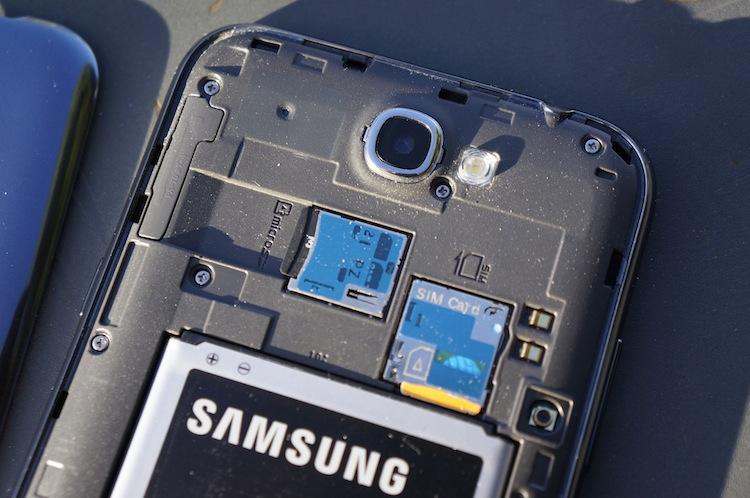
Device storage space has been sort of a hot topic lately. Some manufacturers get the big picture and either offer built-in storage capacities, expandable storage options or both. Other manufacturers, however, are more conservative on storage options for various reasons.
The iPhone, for instance, has always come in an array of capacities – currently the iPhone 5 is sold in 16GB, 32GB or 64GB. And, internationally, Samsung offers its Galaxy S III and Galaxy Note II in the same capacity options, yet the devices also bear microSD card slots for those who simply need more space.
As of late, HTC has received some backlash for fitting the Windows Phone 8X and DROID DNA with only 16GB of built-in storage with no option to expand. And the latest Nexus handset, the Nexus 4 by LG, comes with either 8GB or 16GB of storage.
As I explained last week, both Google and HTC have explanations as to why they choose those particular storage options and do not offer microSD slots. Google's explanation came by way of Matias Duarte, Director of Android Operating System User Experience, through a comment made on his Google+ page. Durate said:
"Everybody likes the idea of having an SD card, but in reality it's just confusing for users. If you’re saving photos, videos or music, where does it go? Is it on your phone? Or on your card? Should there be a setting? Prompt everytime [sic]? What happens to the experience when you swap out the card? It’s just too complicated."
No matter how frustration-free Google feels a single storage drive may be, there is one thing to say about expandable storage: it's there if the user wants or needs it. Having options is hardly a bad thing. But limiting users because you believe they might not have the mental capacity to wrap their heads around two storage drives is nonsensical. It's also a bit insulting to consumers.
HTC's explanation was a reply to a comment asking about the storage space on the DROID DNA on the HTC USA Facebook page. Shortly after the comment was posted, it was removed. It read:
"U.S. customers have easy access to cloud storage solutions through Verizon Wireless’ 4G LTE network and ample access to Wi-Fi. This fact was balanced with the desire to make DROID DNA as slender as possible with an incredible 5-inch HD screen."
At least Duarte's answer makes logical sense, though. As for making the device "as slender as possible", the same could be achieved by fitting it with 32GB of inbuilt storage.
I have been pondering HTC's response since before the comment popped up on Facebook. I was told the very same thing at the DROID DNA press event in New York last week. "You have ample access to cloud storage via the super fast Verizon Wireless 4G LTE network."
Sure, I do. But that doesn't mean I want to store everything in the cloud. And it certainly doesn't mean I can use cloud storage as much as I want. If I still had unlimited data, if Verizon or AT&T still offered unlimited data, cloud storage as an alternative to on-device storage might be acceptable, but only just so. Verizon's affordable data plans are meager is size, and the larger ones are astronomically expensive.
That doesn't even take into account the user experience of cloud storage. For one, it's still using a second storage drive, only one that's accessed through a removt server. And managing what's stored in the cloud and what's on the device is arguably worse and more convoluted than organizing files between two local drives. Not only that, but there are things I don't want to store remotely, and some things I can't. Chatting with David Beren of our network site TmoNews, he hit the nail on the head:
"When it comes to a real-world use cases for cloud storage, the best uses still focus on image and/or cloud document backups. Going all-in with cloud storage beyond those two aspects still seems like pipe-dream, or a half-finished promise we may never see recognized."
The majority of what I store on my devices are applications and games. I filled my 8GB Nexus 7 up with just over 30 applications and six games. I also filled my HTC One X (16GB) up with just a few games, 80 or so applications, maybe 60 pictures and no more than 200 locally stored songs through Spotify. I was constantly moving things around, deleting apps and other files to make more room to stave the "Low Storage" prompts.
The last time I checked, apps and games can't be installed in the cloud. And install files for those are rapidly growing in size while music, movies and other files are staying roughly the same size as before. This is creating a bottleneck.
In short, cloud storage is a sad excuse for (and should never be used to justify) skimping on device storage. It's a crutch that screams, "We're cutting costs where we can, even at the expense of user experience." And I can't support HTC in that. (It's a bit more justified in the Nexus 4, seeing as the device only costs $299 or $349 without a contract.)
Where do you stand on the issue? I know a lot of reader commented that they rarely fill 16GB phones up. But there are a lot of people upset over the ordeal. Manufacturers, at the very least, should offer larger capacities as an option. And cloud storage is not a scapegoat.